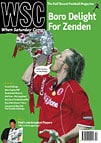 English Football and its Finances report makes 30 recommendations. Roger Titford argues that they are flawed and too idealistic
English Football and its Finances report makes 30 recommendations. Roger Titford argues that they are flawed and too idealistic
I remember lobbying MPs in the 1980s about the supporters’ identity-card schemes and being appalled at how out-of-touch and reactionary MPs were then. This report, English Football and its Finances, bears testimony to the sea-change in MPs’ attitudes to football and how much ground the “fans’ agenda” has captured. Sadly, this may be its only achievement.
The all-party parliamentary report has been produced now because the survival and prosperity of smaller clubs makes good political sense for New Labour, a shining example of co-operative and community-based organisations working for the common good. Amazing as it might seem to 1980s Thatcherites, football clubs have become helpful instruments of “social control”, linked with initiatives to save water, promote railway safety, spearheading teenage health programmes and running education in the community schemes.
The report makes 30 recommendations and the heart is in the right place with nearly all of them. But the overwhelming feeling is that the MPs have sailed up the creek of idealism and into the jungle of regulation. Any red-blooded capitalist, once declared a “fit and proper person”, will think twice about investing in such a bureaucratic world where budgets have to be approved two years in advance, licences obtained and corporate social responsibility obligations audited and met. Good thing, too, many may say, but it makes me wonder where the chairmen of the future, who will inevitably finance some of these clubs, will come from.
Some recommendations are hard-edged, such as endorsing the principle of collective selling of television rights and defining games such as the Turkey v England qualifier as “crown jewels” events to be televised free-to-air. But others are hopelessly vague, such as asking that as many matches kick off at 3pm as possible and giving as much notice as possible if they are changed. This is what happens already. To get beyond that a hard choice must be made – do the broadcasters pay less for rights and the spectators get more 3pm kick-offs, or not?
One recommendation quickens the pulse: “football authorities to be given an explicit duty to promote the competitiveness of the professional game”. Interesting, but how exactly? Set squad sizes or number of international players, limited transfer budgets, a points handicap at the start of the season? Many possibilities, but apart from hesitant hints on gate- sharing and wage-capping, none in the report.
Any report on football tries to walk the same tightrope of appearing democratic and progressive while not offending the big clubs. Manchester United and Arsenal (and, occasionally, a couple of others) offer, in first-class stadiums, probably the best football ever seen in this country. They get enormous media exposure which may encourage people to become football fans. Yet there are intelligent followers of the game who are happy to see them lose in European competition – because if they won they would get even further financially ahead of all the other clubs with whom they are supposed to share a common interest.
The report is flawed because it does not address the “superclub” issue, barely talking to the current big three, and completely ignores the G-14. Richard Scudamore, chairman of the Premier League, attacked its headline recommendation on financial redistribution to the Football League thus: “It’s unlikely clubs will agree to signing another cheque for five per cent [more]. Any redistribution would make our clubs less competitive in Europe.”
That’s the nub. The Arsenal programme reviews what’s happening in European leagues not the Football League: they play European sides more frequently than League sides. Mentally, they are in a European super league.
Peter Kenyon, when at United, was more explicit, suggesting there was only room for 40 pro clubs in England. As a representative of a plc needing to maximise shareholder value he would say that, wouldn’t he? Wiping out 50 clubs and putting United superstores in those towns would be ace marketing, but not great for the social good. The report quotes a little-known FA regulation saying clubs must be private companies rather than plcs. Enforcing this “as a way of promoting the competitiveness of the game” and its common bonds seems to have been too radical a suggestion to make.
The report ends with that worn-out Shankly quote about life, death and football. It’s another easy choice by the MPs: sounds good but does not tell us anything new. Nevertheless, this is still incredible progress on what the Commons intake of 1987 would have come up with and we should be thankful for small mercies.
From WSC 206 April 2004. What was happening this month